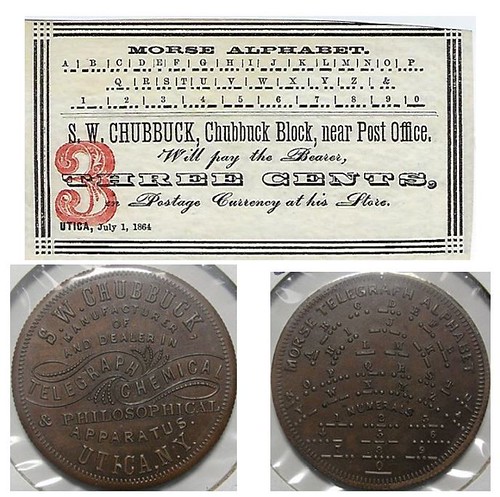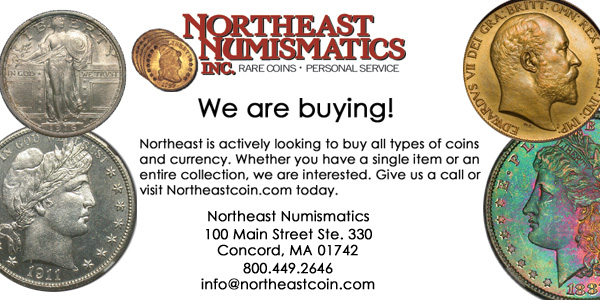
PREV ARTICLE
NEXT ARTICLE
FULL ISSUE
PREV FULL ISSUE
S.W. CHUBBUCK AND THE BEETHOVEN EFFECTThe September 2021 issue of Nena News from the New England Numismatic Association has a nice article by C. John Ferreri on a topic we've discussed earlier - the interesting scrip notes issued by S.W. Chubbuck. With permission, we're republishing it here. Thanks! -Editor S.W. Chubbuck was a manufacturer and dealer of telegraphic equipment in Utica, N.Y. Samuel F. B. Morse was the inventor of the code used in transmitting telegraphic messages. He also was a keen admirer of the music of Ludwig von Beethoven, especially the 5th Symphony. Like many other issuers of merchant scrip the Chubbuck company customized some of its notes to give them some personality of their own One of the notes Chubbuck issued actually had the Latin alphabet displayed and the equivalent code markers (Morse Alphabet) for each letter printed underneath. The note shown here was payable in U.S. Postage Currency (early issues of U.S. Fractional Currency). Mr. Chubbuck also issued copper tokens with the Morse Alphabet and Numerals showing.
The scrip shown above was printed and issued by this merchant for the reason of facilitating the making of change for
his customers in the Chubbuck store. During the first half of the 19th century there were times when hard money became
scarce due to economic hard times. People tended to hoard metallic
coins, especially silver and gold and not use them as was intended
and this hindered commerce. To fill the void many merchants and
municipalities actually issued their own small denomination paper
Most merchant scrip appeared as typeset and plain as can be paper notes issued in fractions of a dollar and redeemable in amounts equaling whole dollars. Often the merchant would have a design printed on these small bills denoting the type of business he was engaged in. A seller of sewing machines could have the image of a sewing machine; a shoe smith could have an image of a shoe or boot, etc. So, it came to be that Mr. Chubbuck the purveyor of telegraphic equipment had the Morse Code displayed on this issue of his scrip. The Morse code was the communication vehicle that was transmitted by telegraph. Maybe he thought he should be touting that fact by educating local residents who might not know.
Beethoven wrote his 5th Symphony 30 years before there was a
telegraph but Morse found a way to remember him within his code
markers. For the letter Many unusual anecdotes such as this come to light when collecting old paper money. To learn more about incidences like this visit the Currency Club of New England. It meets in Waltham once a month. Detailed information appears in the club listings toward the back of this booklet. Come visit with us! Tell us your story! Chubbuck copper token images were taken from the Internet.
For more information on the New England Numismatic Association, see:
To read earlier E-Sylum articles, see:
Wayne Homren, Editor The Numismatic Bibliomania Society is a non-profit organization promoting numismatic literature. See our web site at coinbooks.org. To submit items for publication in The E-Sylum, write to the Editor at this address: whomren@gmail.com To subscribe go to: https://my.binhost.com/lists/listinfo/esylum All Rights Reserved. NBS Home Page Contact the NBS webmaster 
|

